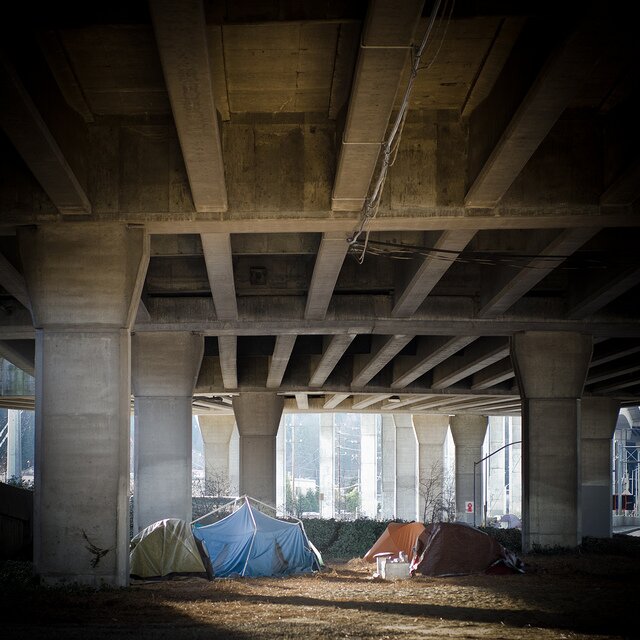
Seattle-based outdoor outfitter REI has a logo that includes two mountain peaks that could also double as tents, pitched on top of its logotype. Camping outdoors is a symbol of autonomy, self-sufficiency, living close to nature.
But camping outdoors in Seattle is a civic headache that’s become chronic as the recession’s effects drag on. The longer it takes the city’s leaders to decide how best to help the homeless families who aren’t well-served by shelters, or homeless adults who bridle at shelter rules and regulations they have little input on, the more entrenched a nomadic tent-city lifestyle becomes.
Last week, just as Mayor McGinn and City Council members Nick Licata and Mike O’Brien announced one practical and one policy fix–proposing the ongoing use of the Lake City’s old Fire Station 39 structure as a shelter, and passing an ordinance to let churches host encampments on their own recognizance, as it were, “while providing standards and guidelines for hosts and peace of mind for neighbors”–Nickelsville moved back to West Seattle, saying they were tired of being strung along by the city. From their site:
Last May, 2010 we were advised to give the new Mayor a chance. Last August the Mayor’s Encampment Panel got started and recommended giving us a permanent site. 7 months ago we were told that the Sunny Jim site would be ready in 5 months. Now Council President Conlin says he’ll decide what to do by the fall. We think this fall Council President Conlin will say maybe something will be ready next spring.
You can sympathize with the residents of Nickelsville–they were promised a semi-permanent location south of downtown (SoDo). Because of mild industrial-use contamination at the site, though, readying the location for human habitation was going to cost money, and the City Council (not unwisely) stopped to reflect whether the money might be better spent on, perhaps, rental vouchers, rather than a homeless campground.
On the other hand, this is a stunningly obvious solution, and yet Nickelsville has been tramping around since fall of 2008. So some part of this is not that simple. At issue is the homeless activism behind Nickelsville’s existence–you get the sense that in their view, they are a community looking for a home, whereas government sees a social ill that needs to be ended. (It should be noted that while Nickelsville is a tent city, not all tent cities argue Nickelsville’s brand of self-determination.)
There’s public resistance to “institutionalizing homelessness” if the city or county creates a permanent encampment (which has lead to linguistic contortions such as a “semi-permanent home”)–or even rents housing.
But the homeless know that programs end, whether or not homelessness has, so the alternative is to institutionalize urban nomadism, which, in the absence of productive reasons to move, can become the self-fulfilling purpose of tent city life. Instead of a barren plain of joblessness and homelessness stretching into the future, the view is broken up by quarterly relocations that give everyone something to do. This is the most important facet of a tent city–its self-organization is evidence that its inhabitants are capable of looking after themselves in ways that many other homeless people are not.
It’s a fact of history that Seattle’s Hoovervilles (which sprang up during the Depression in the SoDo area, ironically enough) were difficult as a blackberry patch to get rid off, even when the economy began to improve. The shacks were burnt down, and popped back up, just as today “homeless sweeps” often raze illegal encampments, trashing tents and belongings.
Seattle’s largest Hooverville took up nine acres and lasted ten years, until 1941, when it was doused with kerosene and burnt to the ground. There was a war on, and the land was needed. There are many things you can learn from that history, but one salient lesson is that permanence isn’t all it’s cracked up to be, not in city limits, anyway.
It’s a trying situation, but Seattle can’t tell Nickelsville what to do, really, until the group has something they don’t want to lose: a home. So far the city has been unwilling to risk making that offer, even if that would provide the foundation for future negotiations. Maybe the word “home” is simply too fraught with associations and expectations. A previous era generated the term “residence hotel,” which strains to sound posh. How about, after REI, a residence cooperative?
Warren Buffett, the world’s third-richest person, has said he is concerned about inequity in the U.S.
“There has never been a larger gap between earnings in this country,” said Howard Buffett, who was in Des Moines to deliver a speech at the World Food Prize conference. “There has never been a time in my lifetime when the government is going to cut an incredible amount of programs that support poor people and feed them.”
The younger Buffett, a farmer and philanthropist, said obtaining enough food has become more difficult for more people.